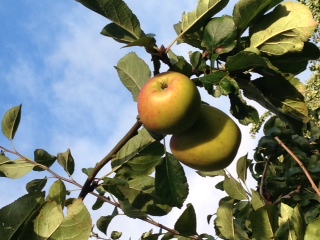|
There’s a very wise old saying that our Grannie’s used to say, ‘an apple a day keeps the doctor away’ but is there any truth in it? Well, like much of the wisdom passed from one generation to the next, there most certainly is and this little nugget packs a powerful nutritional punch! Our recipe today couldn’t be simpler…..good old fashioned stewed apple. There’s nothing more comforting or delicious on a cool autumn day. You can of course buy Bramley cooking apples (any apples will do) in the supermarket but ask around at Farmer’s markets as there are other sweeter varieties available. Also, if you know friends or relatives who have an apple tree and don’t ever harvest it (what a crime against nature!) then ask them if you could pick their fruits. You could always give them a ready -made desert in exchange! Now to those appleicious benefits…… Research has shown that compounds in apples can be cancer protective, cardio protective and can even help prevent diabetes and other chronic illness. This is because of the high antioxidants and phytonutrients in apples. In particular, compounds known as FLAVONOIDS including Quercetin have been well researched and are known for their anti-inflammatory benefits. Quercetin Apples contain high amounts of quercetin and other beneficial compounds. Quercetin is a natural antihistamine meaning that it can naturally lower the effects of allergic symptoms such as watery eyes, coughs, runny nose, eczema etc. Studies suggest it may even be used as an anti-allergic drug. Quercetin has also been researched for its' cancer protective capabilities. An interesting study looked at the effects of low dose Quercetin on cancer cell specific inhibition of cell cycle progression. "Most of the studies which have shown the antitumor activity of quercetin were performed with a high concentration of quercetin, rangin from 25 μM to 200 μM. But pharmacokinetic research reveals that the peak concentration of quercetin in blood after food uptake reaches to a peak of around 10 μM [Gugler et al., 1975; Nielsen et al., 1997; Hollman et. al., 1997]. Therefore we focused on examining the effectiveness of physiologically relevant concentrations of quercetin, by administrating low amounts of quercetin every 24 h to breast cancer cells to mimic the conditions experienced by daily consumption. Here, we show that clinically relevant amounts of quercetin induce cell cycle arrest in the G0/G1 phase through hypo-phosphorylation of pRb, which is accompanied by the induction of CDK inhibitor p21." Another study published in the journal of Experimental Biology and Medicine found that quercetin helped reduce cellular death that is caused by oxidation and inflammation of neurons in the brain. Apples and the microbiome Increasingly, researchers are realising the significance of the microbiome for all aspects of health. What we eat impacts the microbiome and influences the bacteria species that live in our guts. Apples are just one food that can be beneficial in assisting the proliferation of beneficial bacteria in the gut. In an interesting study healthy adults noted an increase of Bifidobacteria species and Lactobacillus on a diet of 2 apples a day for 2 weeks and apple consumption was found to have a beneficial effect on the intestinal environment. Apples also contain pectin and are a good source of dietary fibre. Leave the skin on and there's even more! Most people in the UK currently don't consume enough dietary fibre. We should be aiming to consume about 10 fruits and vegetables a day to get the amount of fibre and phytonutrients for optimal health. Including apples in your diet is a good place to start. Vitamin C Vitamic C, another important antioxidant is provided for in abundance and researchers at Harvard Medical School advise that just one apple gives us 11% of our daily requirement. Cardiovascular health and Diabetes Since Type 2 Diabetes and Cardiovascular Disease are on the increase we need to take heed of Grannie’s message as not only can polyphenols help regulate blood sugar, eating just one apple a day can reduce total cholesterol and LDL. The good news is that the Nutritional Value does not reduce greatly on cooking and if you have a sensitive tummy and can’t tolerate a raw apple, cooking in a variety of ways can aid digestibility. Stewed Apple Recipe How to prepare…..ideally organic and with the skin on as the skin contains up to 3-4 times the amount of phytonutrients as the flesh. ```6 Bramley cooking apples (or apples of choice preferably grown organically) 1/2 cup water
Directions Peel and core the apples and chop them into small evenly sized pieces. Put all the ingredients in a covered, heavy-bottomed pan and cook for about 15 minutes, stirring regularly. Cook until soft with rough shapes, no longer identifiable as apple slices. The colour should be a russet brown with the cinnamon effect. According to Norse mythology a magic apple can keep us young forever and I think you can see why! Well, I’m not taking any chances…..Make ‘an apple a day’ an essential part of your health insurance! Enjoy xx
0 Comments
Leave a Reply. |
Amazon Associates DisclosureNourishing Insights is a participant in the Amazon EU Associates Programme, an affiliate advertising programme designed to provide a means for sites to earn advertising fees by advertising and linking to Amazon.co.uk. Archives
December 2023
|
WHAT OUR CLIENTS ARE SAYING“I did Nutritional Therapy with Beverley and it was life changing. I highly recommend it!” Allison Blakely (Glasgow)
|
Contact Us |



